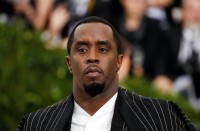by Deborah Cole
BERLIN, Germany (AFP) — The Berlin film festival, Europe’s first major cinema showcase since the Harvey Weinstein sex abuse scandal roiled the industry, starts Thursday with 400 new movies slated and a controversy of its own brewing.
US filmmaker Wes Anderson will kick off the race for the Golden Bear top prize with the animated feature “Isle of Dogs,” voiced by a starry cast including Bryan Cranston, Bill Murray, Jeff Goldblum and Oscar nominee Greta Gerwig who are all expected on the red carpet.
Organizers said they were careful to promote diversity with their selection — four of the 19 films in competition are by women — and to disqualify filmmakers accused of sexual misconduct.
But debate around sex and power looked set to dominate the 11-day event, on screen and off.
#MeToo
The Berlinale’s veteran chief Dieter Kosslick said it would provide a “forum” to bring about “concrete changes” to the treatment of women in the film industry in the wake of the #MeToo movement.
He said he blackballed a handful of potential contenders because a director, screenwriter or star attached to the production was facing credible abuse allegations.
But even before the event began, a South Korean actress accused organisers of hypocrisy for inviting acclaimed director Kim Ki-Duk, who slapped her and allegedly forced her into unscripted sex scenes while she worked on his movie “Moebius.”
Kosslick told AFP the festival was aware that Kim had been convicted and fined in the case, but also that the sexual harassment allegations had been dismissed for lack of evidence.
The Berlinale “is awaiting detailed information” from the production company and the Korean Film Council about a pending appeal, Kosslick added. “Obviously the Berlinale condemns and opposes any form of violence or sexual misconduct,” he said.
Women out in front
Long relegated by Hollywood to the role of muse, victim or plucky sidekick, women look set to be in the driving seat in many of the highest profile Berlinale movies.
“The Crown” breakout star Claire Foy and French screen legend Isabelle Huppert will dominate the action in two keenly awaited thrillers.
Steven Soderbergh will unveil “Unsane,” a movie he shot on an iPhone, featuring Foy in a Hitchcockian tale of a woman fighting to regain her freedom after she’s committed against her will to a mental asylum.
Huppert is in femme fatale mode in the 1945 novel adaptation “Eva,” wreaking havoc in the life of a prominent writer.
“Damsel,” billed as a feminist Western, stars Robert Pattinson as a bumbling cowboy hoping to rescue his quicker-witted beloved (Mia Wasikowska).
And the biopic “Becoming Astrid” sheds a new light on the tragic early life of the beloved author of the “Pippi Longstocking” books, Astrid Lindgren, and how it inspired one of the greatest heroines of children’s literature.
Stars slip behind camera
It’s the actor’s age-old dream to wrest control from the director on set and two Berlinale guests have managed to mount their first passion projects in a tough market environment.
Britain’s Rupert Everett, a pioneer of gay cinema, will present “The Happy Prince,” an Oscar Wilde biopic in which he also stars.
Meanwhile, Idris Elba, of television’s “The Wire” and “Luther” and rumoured to become the first black James Bond, will be in Berlin with “Yardie” set among West Indian drug gangs warring on London streets.
Ripped from the headlines
Brazil’s Jose Padilha will premiere “7 Days in Entebbe” starring Rosamund Pike and Daniel Bruehl, based on the true story of the daring Israeli rescue mission following the 1976 PLO hijacking of an Air France jet.
Norwegian contender “U – July 22” also promises to be a harrowing drama, based on the 2011 massacre by neo-Nazi Anders Behring Breivik and told from the perspective of his 77 victims.
“Museum” starring Gael Garcia Bernal depicts the shocking heist of priceless ancient artifacts from Mexico City’s National Museum of Anthropology in the 1980s.
Beyond the cinema
The Berlinale ranks with Cannes and Venice among Europe’s top film festivals and sees itself as the most socially engaged.
It will stage a screening for inmates at a local prison of “The Silent Revolution” based on a little-known story of protests against East Germany’s communist regime.
The event will also reach out to the tens of thousands of asylum seekers who have arrived in the German capital since 2015, offering internships to young refugees and free movie tickets for adults and children.
© Agence France-Presse








